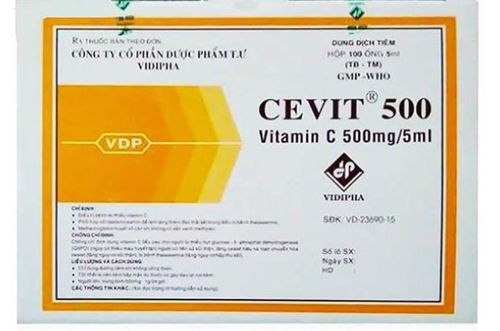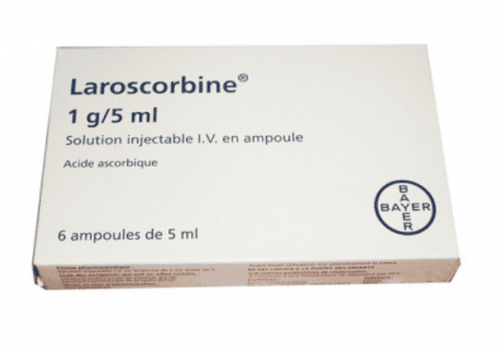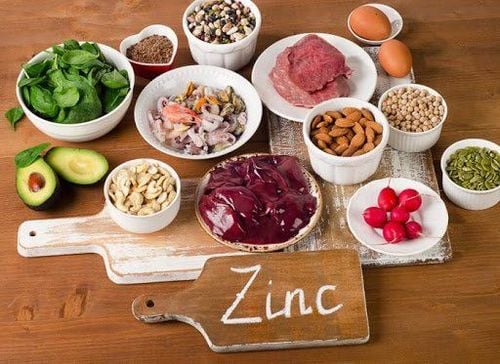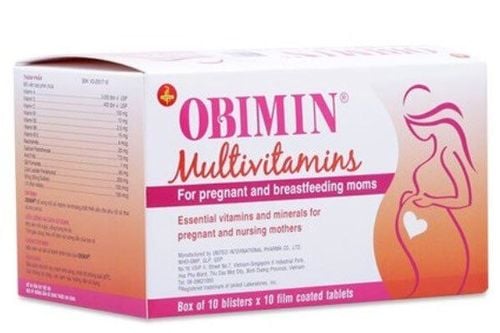Redoxon is often prescribed to prevent and treat Vitamin C deficiency. So what is Redoxon and what should be noted when using it?
1. What is Redoxon?
Redoxon is a product of PT Bayer Indonesia, the ingredients include Vitamin C and zinc, so it is often prescribed for cases of deficiency of these two nutrients.
In addition, Redoxon is also used for the purpose of preventing and treating vitamin C and zinc deficiency in some conditions that increase the body's need or increase the risk of deficiency, often found in patients or people at high risk of infection, colds, smoking, after surgery or supporting wound healing.
Ingredients of Redoxon:
Vitamin C (or ascorbic acid) 1000mg;
Zinc (in the form of zinc citrate) 10mg;
Some excipients such as sodium hydrogen carbonate, citric acid, malic acid, isomalt, macrogol 6000, acesulfame potassium, aspartame, citrus flavor and some other ingredients.
2. What is the effect of redoxon?
Vitamin C (also known as ascorbic acid) is a water-soluble vitamin that acts as an important antioxidant in the body. In fact, the body has a relatively low capacity to store this vitamin, so a regular supply is extremely necessary. Vitamin C and dehydroascorbic acid (its metabolite) form an oxidation-reduction recovery system, which is involved in many enzymatic reactions. In addition, Vitamin C acts as a cofactor in some hydrolysis and amidation reactions through the action of transferring electrons to enzymes to form an equivalent reducing agent. The importance of Vitamin C to human health has been demonstrated through many clinical evidences such as vitamin C deficiency causing Scurvy.
The typical manifestations of scurvy are slow wound healing, bone growth disorders, decreased vascular strength or defective tooth structure... and all are related to the decrease in collagen formation.
Another ingredient in redoxon, zinc, also plays an important role. Like vitamin C, low zinc levels can slow wound healing, increasing the risk of developing skin ulcers due to prolonged lying down. At the same time, zinc plays an extremely important role in the ability to maintain effective immune responses, the most important of which is the immune response mediated by T cells.
Contraindications to the use of redoxon:
Kidney stones or a history of kidney stones;
Hyperoxaluria;
Severe renal failure with a glomerular filtration rate GFR below 30ml/min, including cases on hemodialysis;
Hypersensitivity or allergy to any ingredient in redoxon.
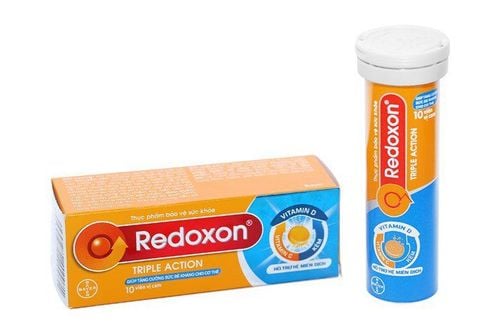
3. Dosage and how to use Redoxon
Redoxon is prepared in the form of effervescent tablets, so when using it, dissolve the medicine in a glass containing 200ml of water and create an orange-flavored drink.
Dosage of redoxon:
Adults and children over 12 years old: 1 tablet/day;
Redoxon is not recommended for use in children under 12 years old.
When used according to instructions, there is no evidence that redoxon can cause overdose. However, vitamin C and/or zinc can be provided from many different sources. Symptoms, test results and consequences of redoxon overdose are very diverse and depend on the constitution and sensitivity of each person.
General manifestations of vitamin C and/or zinc overdose due to redoxon may include digestive disorders (including diarrhea, nausea and vomiting).
In addition, Vitamin C overdose can manifest some abnormal symptoms as follows:
Acute or chronic vitamin C overdose (using more than 2 g/day) causes increased serum and urinary oxalate concentrations, leading to the risk of calcium oxalate crystal deposition in the urine, thereby forming kidney stones, renal tubular or interstitial diseases or more seriously, acute renal failure. It should be noted that patients with renal failure (mild to moderate) may be more sensitive to overdose, so consult a doctor before using redoxon;
If using Vitamin C at a dose of more than 3 g/day in children and more than 15 g/day in adults, it can lead to oxidative hemolysis or disseminated intravascular coagulation in patients with G6PD deficiency.
If using zinc overdose can lead to the following abnormal manifestations:
Causes irritation and corrosion of the digestive tract;
Acute tubular necrosis;
Interstitial nephritis;
Copper deficiency;
Sideroblastic anemia;
Spinal cord disease.
4. Side effects of Redoxon
The side effects of Redoxon are mostly spontaneous, so it is difficult to assess the frequency of occurrence, including:
Digestive disorders such as diarrhea, nausea, vomiting, stomach pain and abdominal pain;
Immune system disorders including allergic reactions or anaphylactic shock;
Unwanted effects when using Vitamin C:
Heartburn;
Abdominal cramps;
High doses will cause hyperoxaluria, hemolytic anemia, insomnia or flank pain.

5. Drug interactions of Redoxon
Drug interactions of Redoxon will include interactions of Vitamin C and zinc. In particular, some interactions of Vitamin C that need to be noted are as follows:
Desferrioxamine: Vitamin C increases the toxicity of iron in tissues, especially in the heart because it can lead to decompensated heart failure;
Cyclosporine: Vitamin C can reduce the concentration of cyclosporine in the blood;Disulfiram: Using high doses or prolonged use of Vitamin C can affect the effectiveness of disulfiram;
Indinavir: High doses of Vitamin C can reduce the concentration of the drug in the serum, thereby significantly affecting the effectiveness of indinavir;
Warfarin: High doses of Vitamin C can affect the effectiveness of warfarin;
Aspirin: Using 2 active ingredients at the same time can lead to increased excretion of Vitamin C and decreased excretion of Aspirin in the urine. Aspirin can inhibit the absorption of Vitamin C by leukocytes and platelets, so the concentration of this Vitamin C will decrease, only slightly higher than in people with ascorbic acid deficiency in tissues. However, there is no evidence that the use of Aspirin will promote Vitamin C deficiency. Vitamin C supplementation in people taking aspirin cannot increase the concentration of ascorbic acid in leukocytes or Vitamin C reserves in tissues. Therefore, this combination is not guaranteed;
Vitamin B12: Taking high doses of Vitamin C can destroy Vitamin B12, so high doses should be avoided within about an hour of taking Vitamin B12;
Some common drug interactions when using zinc supplements:
Copper: Zinc reduces copper absorption;
Iron: The bioavailability of zinc is reduced when high concentrations of iron ions are present in supplements.
6. Some notes when using Redoxon
Some precautions when using Redoxon:
Absolutely do not exceed the recommended dose of Redoxon. Overdose of vitamin C can lead to some adverse health effects as mentioned above.
Consult your doctor or pharmacist before taking Redoxon if you are currently taking single vitamin C supplements, multivitamin preparations or any other medications;
Patients with a history of kidney failure should consult and discuss with their doctor before using high doses of Vitamin C;
In cases where G6PD deficiency has been determined, Vitamin C should not be used in higher doses than recommended because the risk of overdose is associated with a dangerous condition called hemolytic anemia;
Take Redoxon 4 hours apart from other medications;
Vitamin C can affect the results of some tests, including blood sugar tests.
Therefore, users of Vitamin C should inform their doctor if any type of test is prescribed;
Redoxon contains Aspartame, so it is not recommended for use in people with phenylketonuria;
The drug is quite safe during pregnancy when used as directed by a doctor, however, there are still not enough studies to assess the risks of the drug during pregnancy, so it should only be used when prescribed by a medical professional. Large amounts of vitamin C taken during pregnancy can increase the need for vitamin C and potentially lead to scurvy in infants, so it should not be used in excess of the recommended dose;
The drug is also quite safe for women who are breastfeeding when used as directed, however, the drug should only be used when prescribed by a medical professional because Vitamin C and zinc are excreted in breast milk.
Redoxon is often prescribed to prevent and treat Vitamin C deficiency. To ensure effectiveness and avoid side effects, patients need to take the drug as prescribed or consult a doctor or pharmacist.
Follow the Vinmec International General Hospital website to learn more about health, nutrition, and beauty to protect the health of yourself and your loved ones.
Please dial HOTLINE for more information or register for an appointment HERE. Download MyVinmec app to make appointments faster and to manage your bookings easily.
To arrange an appointment, please call HOTLINE or make your reservation directly HERE. You may also download the MyVinmec app to schedule appointments faster and manage your reservations more conveniently.
